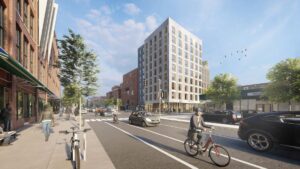Developers of a proposed 100 percent affordable housing project in Cambridge’s Porter Square are rethinking their plans after withdrawing the 48-unit project days ahead of a crucial board vote.
Cambridge-based Capstone Communities and Hope Real Estate Enterprises have sought to redevelop the 2072 Massachusetts Ave. property, which contains a single-story restaurant building, as income-restricted housing under the state’s Chapter 40B affordable housing law.
“We are 100 percent committed to building a high quality affordable housing community on this site but plan on taking a long break and regrouping. We are obviously very disappointed about this outcome after putting our hearts and souls into this proposal and generating as much support as we did,” Capstone Communities Principal Jason Korb said in an email.
Board of zoning appeals members objected to the height of the building, which would range from 6 to 9 stories, at a hearing in May and prepared to revisit the issue in September.
In an Aug. 27 letter to the board of zoning appeal, attorney Jennifer Schultz of Sullivan & Worcester said the developers are still planning to develop affordable housing on the property, but withdrawing their application “to provide all stakeholders the opportunity to come back to this project fresh.”
Developers have the option of pursuing approval under a new Cambridge zoning ordinance for all-affordable projects, but would be limited to just 30 units under that mechanism, Schultz wrote.
Since the project was originally proposed, Cambridge has passed a local ordinance which makes it easier for developers to build all-affordable projects anywhere in the city, with buildings heights up to 80 feet in some zoning districts.
At a BZA meeting in May, member Jim Monteverde suggested the project should be limited to the 80-foot maximum height in the new ordinance, according to a report in the Cambridge Day.
In her letter to the board, Schultz stated that developers have the option of pursuing approval either under Chapter 40B or the new overlay district.
“EIther path remains available for developers, including the applicant here, and in this case the [Chapter 40B] process allows for a project with more significant community benefits,” Schultz wrote.
Developers proposed 40 units reserved for households earning a maximum 60 percent of the area median income and eight units at a maximum 30 percent of area median income, located in a Passive House-design all-electric building.
Following the latest news, the housing advocacy group A Better Cambridge urged the city council to amend the affordable housing overlay to include 2072 Massachusetts Ave. and similar projects.
“Our collective priority is to build housing – especially affordable, transit-oriented, sustainable housing – that provide more people with an opportunity to live here. 2072 is an example of how flaws in current zoning policies limit progressive, inclusive housing development,” the group said in a statement.
Editor’s note: This report has been updated with comment from A Better Cambridge.









